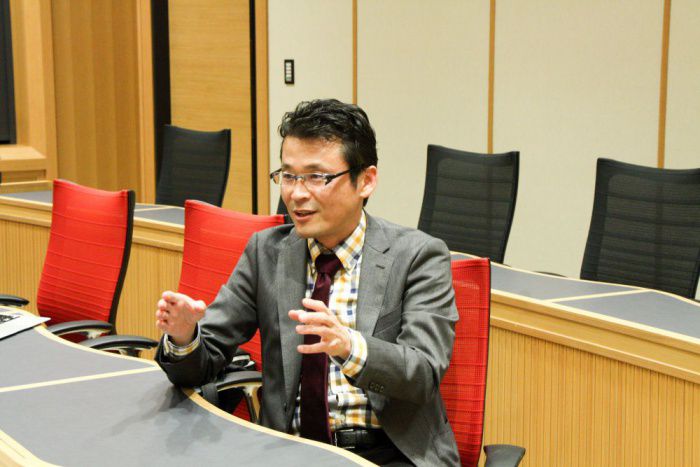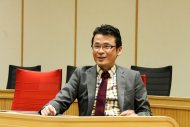Dr. Nobuyuki Nomura, Professor, Graduate School of Management
Professor Namura, who specializes in behavioral observation, is a practicing teacher who is also currently active as a director of a first-class architectural firm. Professor Namura, who has studied abroad, talked to us about "fieldwork, which is also adopted by Harvard Business School.
Interviewed: November 2015
Interviewed by: NUCB Business School Public Relations
What is fieldwork (behavioral observation)?
What is the best part of fieldwork (behavioral observation)?
Nothing comes from nothing. Just by looking at something that exists in the world in a slightly different way, a completely new hit product can be born. I think the fun lies in what you observe and how you observe it. For example, the "Shunsoku" athletic shoes for children. The idea of making the soles of the shoes asymmetrical because the track at elementary schools turns counterclockwise was also born from behavioral observation.
I try to do fieldwork in groups as much as possible. By brainstorming what each of us has discovered, we can come up with completely new ideas. It's also a good way to learn, just by reaffirming that different people see completely different things even when they are looking at the same place.
Do you have any advice for future students who want to participate in fieldwork exercises?
It depends on what each student is obsessed with, which I can't tell you. There are times when it is better to take a maniacal point of view, such as in otaku culture. We are no longer in the "age of mass production," but in the age of diversified orientations, and your sense of smell is important in determining what will be the next hit. Therefore, I think it's better to focus on the issues you find in your own life. I think that the more extreme you are, the more interesting it will be and the more likely you are to create new products.
I think that "observation" is one method. In the field of service science, which has been attracting a lot of attention lately, the method of behavioral observation is being used to scientifically analyze innovations and services.
What exactly is a service?
All kinds of services, even salespeople. Some use the method of behavioral observation to create a manual for the behavior of people who can sell. The difference between those who can sell and those who can't is something that those who can do it don't understand because they do it unconsciously. So a third person accompanies them to observe and compare the behavior of both. By documenting the insights gained from the comparison between the two and making them into a manual, even those who cannot sell will be able to sell to some extent.
Why learn fieldwork?
Is fieldwork also studied in business schools overseas?
In the summer, I went to Boston for a week to participate in an executive training program at Harvard Business School. The training was about the case method, and on the last day, they introduced a class called "FIELD". FIELD is a program that Harvard Business School started as a new challenge for its 100th anniversary. Each team is given $3,000 to conduct fieldwork in an emerging country and eventually start a small business.
Harvard Business School has always taught only the case method, which is a hypothesis-testing method, but they are now trying to introduce fieldwork, which is a hypothesis-extraction method. One of the reasons for this is that when Harvard Business School students go out into the world, they tend to be too preoccupied with thinking, and they are quite frowned upon. In fact, when they go out into the world, things don't go as well as they think they will. Most of the teams end up failing. However, I think it was a breakthrough to create a one-year course called "FIELD" where students can learn from their mistakes. In today's diversified world, I think it is becoming harder and harder to develop a successful business in the world unless we not only test hypotheses, but also make and discover hypotheses. This is why I would like to recommend fieldwork to everyone. New ideas are lying around in the field, and I think the ability to pick them up will definitely become necessary in the future.
What will I gain from the lecture?
In the lectures, I teach how to look at things to gain awareness. It is important to let go of assumptions and look at things more honestly. Students who have taken the lectures often say, "My view of the world around me has changed," and "I can now consciously see things that I used to see unconsciously.

 Brochure
Brochure
 Info Session
Info Session
 Application
Application
 Alumni Voices
Alumni Voices











